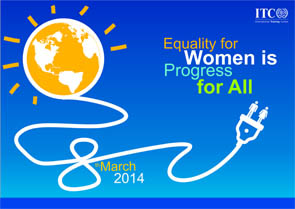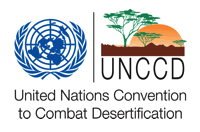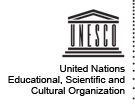International Women's Day 2014
The official United Nations theme for International Women's Day 2014 is "Equality for women is progress for all."
Celebrated by women's rights activists across the world annually on 8 March, International Women's Day (IWD) has been marked by the UN since 1975.
IWD is traditionally marked with a message from the UN Secretary-General as well as with statements and events from across the UN system. This page highlights UN system and inter-governmental observances, events and related links for the Day as they are released.
Spread the Word on Twitter
The #UN has marked International #WomensDay since 1975. See how it's being marked this yr! http://t.co/RwIQ1SjQ2q #IWD2014 v @UNWomenWatch
— UN Women Watch (@UNWomenWatch) March 3, 2014
Official UN Observance at UN Headquarters, New York
12:00–13:00, Eastern Standard Time, 7 March, Trusteeship Council Chamber, United Nations, New York
[Event Flyer]
The UN commemorated IWD on 7 March at its headquarters in New York.
Full Event Webcast
Attendees:
- H.E. Mr. Ban Ki-moon Secretary-General of the United Nations [Speech: Online | Webcast]
- H.E. Mr. John W. Ashe President of the 68th session of the United Nations General Assembly [Speech: PDF | Webcast]
- H.E. Ms. Hillary Rodham Clinton Former United States Secretary of State, U.S. Senator
- Ms. Phumzile Mlambo-Ngcuka Under-Secretary-General and Executive Director of UN Women [Speech]
- Ms. Andrea Nunez Vice President of the World YWCA Board
Moderator: Ms. Isha Sesay, Anchor, CNN International
Related Links
International Women's Day Messages
United Nations
 Message from Ban Ki-moon, UN Secretary-General
Message from Ban Ki-moon, UN Secretary-General
This International Women's Day, we are highlighting the importance of achieving equality for women and girls not simply because it is a matter of fairness and fundamental human rights, but because progress in so many other areas depends on it.
Countries with more gender equality have better economic growth. Companies with more women leaders perform better. Peace agreements that include women are more durable. Parliaments with more women enact more legislation on key social issues such as health, education, anti-discrimination and child support.
The evidence is clear: equality for women means progress for all.
This simple truth must be central as we work to accelerate progress towards the Millennium Development Goals by next year's deadline and craft an agenda for the years beyond 2015.
Important gains have been made in access to primary education for girls and political representation by women. But progress remains far too slow and uneven. Read more »
Spread the Word on Twitter
"The evidence is clear: equality for women means progress for all." - @UN Chief Ban Ki-moon http://t.co/Jawm68apIe #IWD2014 #womensday
— UN Women Watch (@UNWomenWatch) March 4, 2014Related Links
UN Women
Message from Phumzile Mlambo-Ngcuka, UN Under-Secretary-General and UN Women Executive Director

Today we join the people of the world in celebration of the progress made for women's rights, women's empowerment and gender equality. We also acknowledge that progress has been slow, uneven and in some cases women and girls face new and more complex challenges.
International Women's Day is therefore also a day to recommit ourselves to working harder for gender equality, together as women, men, youth and leaders of nations, communities, religion and commerce.
If we act decisively, with the knowledge that empowering women and girls and supporting their full participation can help solve the greatest challenges of the 21st century, we will find lasting solutions to many of the problems we face in our world. Major challenges such as poverty, inequality, violence against women and girls, and insecurity will be addressed substantially.
Women spend the majority of their income on the well-being of their children and family. Raising women's labour force participation increases economic growth. By ending women's poverty, we will sustainably and significantly reduce extreme poverty worldwide. Read more »
Spread the Word on Twitter
Equality for women is progress for all – read @phumzileunwomen's message for #IWD2014 http://t.co/FfDL4ago2v
— UN Women (@UN_Women) March 6, 2014Related Links
International Labour Organization (ILO)

Message from Guy Ryder, Director-General of ILO
"We join our efforts with all who are striving for gender equality"
It is opportune to take stock of the situation with respect to women's status and gender equality in the world of work.
The available information paints a mixed picture.
There has been notable progress in the area of national legislation with most countries having incorporated the principles of equality and non-discrimination. Many governments have adopted active labour market policies to tackle discrimination against women and a growing number of employers' and workers' organizations are implementing initiatives on equal opportunity and treatment. A number of individual women have managed to advance and to break through the glass ceiling.
At the same time, stubborn and often profound gaps persist. Progress in increasing women's labour market participation has been uneven according to our 2014 Global Employment Trends Report. In developed economies, women are expected to benefit less from the timid recovery projected in the medium-term – their unemployment rates will only gradually decline to 8.2 per cent in 2018, whereas for men it is projected to drop to 7.6 per cent. In North Africa women's labour market participation rates in 2013 were barely 25 per cent, and in the Middle East not even 20 per cent. Read more»
Related Links
International Organization for Migration (IOM)
 International Women's Day - IOM Director General Swing: 'Integrate Migrant Women into Development Agenda'
International Women's Day - IOM Director General Swing: 'Integrate Migrant Women into Development Agenda'
The International Organization for Migration calls today on the international community to ensure that migrant women are not left behind in the ongoing discussions on the post-2015 development agenda.
Observing International Women's Day (8 March), IOM Director General, William Lacy Swing, emphasized the urgency to more systematically and thoroughly address the often unique situation of migrant women.
"We have now recognized that migrant women are half of the international migrant population. However, we too often pay lip service when it comes to acknowledging and responding to their specific circumstances and needs," stated Ambassador Swing.
Today, approximately 111 million international migrants are women (from a total population of 230 million). They are present in virtually all types of migration flows, both high-skilled and low-skilled. They are no longer confined to family reunification and increasingly migrate on their own in pursuit of economic betterment. However, poverty and unemployment at home coupled with high demand for domestic and care services abroad push many to resort to irregular means of migration. Read more: English | French | Spanish
Related Links
International Telecommunication Union (ITU)
 International Women's Day: 'Progress for all' through ICTs
International Women's Day: 'Progress for all' through ICTs
ITU celebrates the power of digital literacy to change women's lives as it reaches target of 'one million women trained worldwide'
Over one million disadvantaged women in 79 countries around the world are now benefiting from newly-acquired information and communication technology (ICT) skills thanks to a partnership between ITU, the UN specialized agency for ICTs, and Philippines-based NGO Telecentre.org Foundation.
The Women's Digital Literacy Campaign, launched in 2011 with a target of training one million women around the world, leveraged the combined reach of Telecentre.org Foundation's global network of 100,000 telecentres worldwide and ITU's 193 Member States and 700 private sector members.
The campaign reached its goal earlier this month with a total of 1,014,096 women trained in basic computer skills, through the efforts of 153 participating organizations and 20,000 telecentres around the world. Read more »
International Training Centre of the International Labour Organization (ITC-ILO)
 Message from Patricia O'Donovan, Director of ITC-ILO
Message from Patricia O'Donovan, Director of ITC-ILO
As International Women's Day (8th March) is observed once again throughout the world, it is important to take stock of progress made towards equality for women at work and to consider how we can better contribute to improving opportunities for women's economic empowerment. We know that the road to equality for women at work is long and winding. Economic, social and political crises generate backlashes and erode achievements already made. This is a real risk in many economic sectors and countries today.
The Centre joins the UN System-wide community in declaring that "Equality for Women is Progress for All" which is the theme designated by the United Nations for International Women's Day, 2014. This theme is based on data collected across the UN System which demonstrate that equality between men and women brings real advantages: it is good for families, for societies and for economies. Equality for women also means progress for men and boys as it breaks down stereotypes that constrain them and hinder the fulfilment of many legitimate aspirations.

As an integral part of the International Labour Organization, the Centre contributes to the ILO’s well-established record of advocacy and work towards improving the status of women and recognition of their rights in the world of work. The ILO has launched a Centenary Initiative on Women at Work as one of seven initiatives in the lead up to the ILO’s 100th anniversary (2019) in order to help “equip the Organization to take up successfully the challenges of its mandate in the future.”[1] Under this initiative, the ILO is planning a major assessment of women in the world of work and is launching the process of reflection on the occasion of International Women’s Day, 2014. The Centre will be an active participant in this reflection over the coming months and years. Read more »
Joint United Nations Programme on HIV/AIDS (UNAIDS)
 Message from Michel Sidibé, Executive Director of UNAIDS
Message from Michel Sidibé, Executive Director of UNAIDS
We know well that it is our mothers, wives, sisters and daughters who make it happen. Women around the world are running countries, businesses and raising children. In the AIDS response, it is more likely to be women who care for the sick. It is women who care for their families and communities and it is women who look after the most vulnerable in society.
"Women make it happen, but it doesn't always happen for women." Women face many forms of discrimination.
It is also women who suffer violence at the hands of their partners, are more likely to become infected with HIV and are marginalized in many societies. One out of three women is physically or sexually abused by a partner in her lifetime. Every hour, 50 young women are newly infected with HIV. Half of all people living with HIV in low- and middle-income countries are women––and new HIV infections among women are on the rise in Eastern Europe, Central Asia, the Middle East and North Africa. Read more »
United Nations Convention to Combat Desertification (UNCCD)

Message from Monique Barbut, Executive Secretary of the UNCCD
The equality and resilience of women means progress for all. Progress in our economic productivity, the well-being of our families and our resilience to global environmental challenges, including land degradation and climate change.
A majority of the women, however, lack the right to own or manage agricultural land. They farm abandoned, marginal or communal land, or land owned by others. But they are smart investors. As they have no stake on such land, they will fell trees for charcoal, without replanting. They will cultivate the land, often by the cheapest, yet most damaging land practices.
More than half of the land under agriculture is moderately or severely degraded. Deforestation for agriculture and charcoal production are the lead drivers. Every year, we lose 24 billion tons of fertile soil through erosion. Every year, we lose 12 million hectares to desertification and drought. For every hectare lost to desertification and drought, we lose the possibility to produce 1.6 tons of grain and to store the carbon emissions warming the Earth. Read more (pdf) »
United Nations Development Programme (UNDP)

Message from Helen Clark, Administrator of UNDP
This year's International Women's Day theme – Equality for Women is Progress for All – states a simple truth. No country will reach its full potential if its female citizens do not enjoy full equality. As the 2015 end date of the Millennium Development Goals nears, and as discussion on the next global development agenda intensifies, there is strong momentum for achieving development with equity, including by eradicating gender inequality and empowering women and girls.
Next week, the 58th UN Commission on the Status of Women will convene in New York. Its discussions will focus on "Challenges and achievements in the implementation of the Millennium Development Goals for women and girls." While there has, undoubtedly, been progress for many women and girls, it has been uneven and too slow. The world has officially achieved gender parity in primary education, but regional gaps persist and girls' enrolment drops off at the secondary level. The proportion of women in national parliaments has grown, but women still comprise around only 21 per cent of the world's parliamentarians. Lagging farthest behind is MDG 5, which focuses on reducing maternal mortality and achieving universal access to reproductive health care.
Grounded in international human rights, gender equality doesn't just improve the lives of individual women, girls, and their families; it makes economic sense, strengthens democracy, and enables long-term sustainable progress. Read more »
Related Links
United Nations Educational, Scientific and Cultural Organization (UNESCO)

Message from Irina Bokova, Director-General of UNESCO
International Women's Day has been celebrated by the United Nations on 8 March since 1975 – this is a moment when we review past achievements and look ahead to the challenges that remain, as well as to untapped potential and opportunities.
This stocktaking is all the more important today, as we approach the 20th anniversary of the Beijing Conference and the deadline for the Millennium Development Goals and as we shape a new global sustainable development agenda to follow 2015. In moving forward, we must ensure that women's empowerment and gender equality stand at the heart of all of our work to craft a better future. Read more (pdf) »
United Nations Framework Convention on Climate Change (UNFCCC)

Message from Christiana Figueres, Executive Secretary of UNFCCC
Women are a powerful yet untapped resource in the global effort to meet the challenge of climate change. Empowering women unlocks this potential. Increasing equality creates equitable and inclusive social and economic development, a crucial component of effective climate change response.
The UN actively brings women into the dialogue to shape our future, and the UNFCCC is proud to join in. Bolstered by leaders like Mary Robinson, Patricia Espinosa and Maite Nkoana-Mashabane, as well as by action of groups such as 1 Million Women and the Global Alliance for Clean Cookstoves, the last few years have seen unprecedented progress on gender by Parties to the UNFCCC.
The 2012 Doha Climate Gateway included a decision to promote gender equality in UNFCCC negotiating bodies and report progress towards that goal. And, the Momentum for Change initiative shines a light on women rising to meet the climate challenge with the Women for Results pillar. Read more (pdf) »
Related Links
United Nations Population Fund (UNFPA)
Message from Dr. Babatunde Osotimehin, Executive Director of UNFPA

As we commemorate International Women's Day and celebrate the many achievements of women and girls, we should also remember that for far too many, the ability to live a healthy, productive life free from violence, to fully enjoy their rights, remains an aspiration. So today is also a time to recommit ourselves to delivering once and for all on the promise of gender equality, women's empowerment and sexual and reproductive health and rights for all women and girls everywhere.
Great progress has been achieved over the past two decades in a number of areas. Fewer women are dying in pregnancy and childbirth. In fact, we have reduced maternal mortality by nearly 50 percent. Women's access to family planning and antenatal care has also improved.
More women have access to education, work and political participation. More girls are going to school, with primary enrolment rates approaching 90 percent. This has positive implications for other aspects of their lives and is, in fact, good for all of us, men included. Educated women and girls can make informed decisions about their health and lives. They can claim their rights and contribute more fully to their families and communities. When they are in leadership roles, they can work more effectively to promote sustainable development, peace and good governance. Read more »
World Health Organization (WHO)

Message from Dr Margaret Chan, Director-General of WHO
On this day, WHO joins others in celebrating women's achievements. These achievements are inspiring, and they can inspire change. In health development, as in many other areas, women are agents of change. They are the driving force that creates better lives for families, communities and, increasingly, the countries they have been elected to govern.
As I have learned from my discussions with parliaments in several countries, women are increasingly winning top leadership roles, in rich and poor countries alike, and this helps shape entire societies in broadly beneficial ways. Every time a women excels in a high-profile position, her achievement lifts the social status of women everywhere.
To inspire change, all women need to be free to achieve their full potential. This means freedom from all forms of discrimination, freedom to pursue all opportunities, including education, freedom to earn and spend their own income, and freedom to follow the career paths they decide they want. Read more »
Related Links: